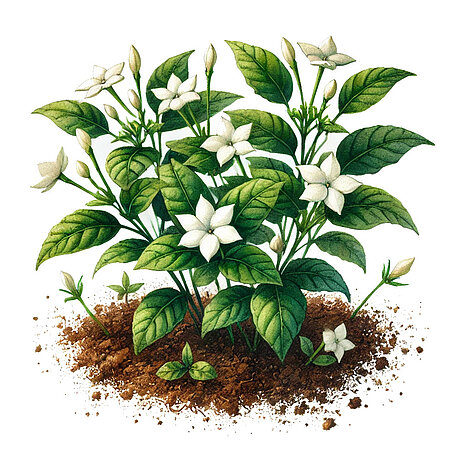Star jasmine

Star jasmine, with its beguiling fragrance and star-shaped flowers, is a popular plant in gardens and on balconies. But while this plant delights our senses, it's important to understand how it can affect the health of our four-legged family members. In this article, we take a closer look at star jasmine, explain what it is, and discuss the pros and cons of its presence in a household with dogs.
What is star jasmine?
Star jasmine (Trachelospermum jasminoides), also known as Jasminum trachelospermum, is an evergreen climber known for its highly fragrant, white flowers that appear in warm months. Originally from East Asia, this plant has established itself in gardens worldwide for its beauty and aroma. Despite its name, star jasmine does not belong to the true jasmine family (Jasminum), but is a member of the dogbane family (Apocynaceae).
Benefits of star jasmine in a household with dogs
Aesthetics and well-being
Star jasmine can create a calming environment through its pleasant fragrance, which can be appealing not only to humans but also to pets. A fragrant garden can help relax and de-stress dogs, as long as they don't interact directly with the plant.
Provides shade and hiding places
As a climbing plant, star jasmine can create areas that provide shade and serve as hiding places, which can be especially enjoyable for dogs during the warmer months.
Risks and disadvantages for dogs
Toxicity
Although star jasmine is non-toxic to humans, parts of the plant, particularly the leaves and flowers, can be toxic to dogs. Ingestion can lead to a range of symptoms, including indigestion, vomiting, diarrhea and, in rare cases, more serious neurological symptoms.
Allergic reactions
Some dogs can have an allergic reaction to star jasmine, either through direct contact or inhalation of the pollen. Symptoms may include skin irritation, sneezing and, in severe cases, breathing problems.
Danger from ingestion
The tendency of dogs to explore and chew things can lead to them swallowing parts of star jasmine. Apart from toxicity, this can also lead to physical problems such as intestinal obstruction.
Better safe than sorry
While star jasmine is an aesthetically pleasing addition to any garden and can potentially create a calming environment for both humans and pets, it's important not to underestimate the potential risks to our dogs. If you have a dog and are considering planting star jasmine in your garden or on your balcony, it's crucial to keep the plant out of your pet's reach and watch out for signs of poisoning or allergic reaction.
If you notice any signs of hypersensitivity or poisoning in your dog, you should see your vet immediately. We are not a substitute for a vet, but we try to be as accurate as possible. Every dog reacts differently and we recommend you get a second opinion or consult your vet if in doubt.
Stay healthy and take good care of your four-legged friend!😊